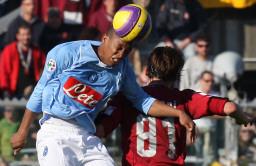The selection of Napoli's coloured defender Fabiano Santacroce for the Italy squad could send a message against racism, Italy coach Marcello Lippi said Tuesday.
''I would be happy if Santacroce's presence helps get the anti-racist message across,'' Lippi said, pointing out that ''intolerance appears to be falling inside soccer but increasing outside it''.
Santacroce, 22, was born in Brazil to an Italian father and a Brazilian mother and grew up in the small town of Casatenovo between Milan and Lake Como.
If picked against Bulgaria on Saturday or Montenegro next Wednesday he would become the second person of colour to play for Italy.
The first, veteran Palermo midfielder Fabio Liverani, on Friday joined the growing chorus of voices warning that the country could be facing an epidemic of racism.
He said he was ''ashamed as an Italian'' after the latest in a series of apparently racist attacks.
Liverani, 32, a half-Somali who won three Italy caps starting in 2001, noted that he was from the same working-class Rome district, Tor Bella Monaca, where Thursday's assault on a Chinese man occurred.
The ex-Lazio and Fiorentina player said he had noticed a rise in intolerance.
''It's like we've travelled 60 years back in time, and the level of violence is rising. Just when we thought some progress was being made things are going backwards,'' he said.
The Chinese immigrant, 36-year-old Tong Hongsheng, was beaten up by a group of teenagers.
An eye witness told police Tong was on his way home when he was surrounded by a group of five or six teenagers who shouted racist slurs before breaking his nose and inflicting other injuries.
Police said the same group attacked two 30-year-old Ivory Coast immigrants earlier this month after shouting racist insults.
Also on Friday, graffiti insulting Anne Frank appeared in another Rome suburb. In another part of Rome someone recently daubed anti-Semitic slogans against Senate Speaker Renato Schifani after he met Jewish leaders.
Insulting graffiti were also found near Milan Friday about a Romanian boy who burned to death in a shanty last week.
Italian human rights groups and the Catholic Church have for months been sounding the alarm over what they say is growing intolerance of immigrants in Italian society.
Earlier last week a case in Parma made headlines when a young student from Ghana was allegedly beaten up by traffic police who reportedly mistook him for a drugs pusher.
Last month an immigrant from Burkina Faso who ran out of a Milan store with a packet of biscuits was killed by the shopkeeper who allegedly beat him to death with an iron bar after hurling racist insults.
The death brought thousands of African immigrants onto the streets of Milan in protest.
Earlier last month the African community in Castel Volturno near Naples rioted after the Camorra mafia mowed down three Ghanaians, two Togo nationals and a Liberian.
A poll of readers of the left-leaning newspaper La Repubblica found 86% agreeing with the proposition that Italy has ''a racism emergency''.
This summer the Italian government was widely accused of racism because of a survey of Roma (gypsy) camps which included the fingerprinting of children.
The government insisted the census - which was eventually OK'd by the European Commission - was not aimed against any specific ethnic group or spurred by a wave of crime-linked anti-immigrant feeling.
In the face of protests, Italy agreed with the European Union to make sure the scheme complied with human rights norms.
It also announced it would require all Italian citizens to have their prints put on ID cards starting in 2010.
But the Council of Europe (CE), Europe's rights body, claimed that Italian politicians had lacked ''the moral leadership'' to face down the kind of anti-gypsy sentiment that led to incidents such as the torching of camps in Naples in June.
On Tuesday Interior Minister Roberto Maroni said ''there have been incidents of racism, it's pointless to deny that, but they've been isolated episodes, not an emergency''.









